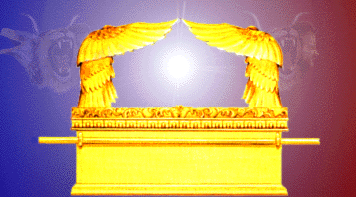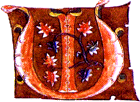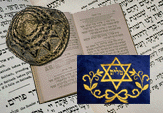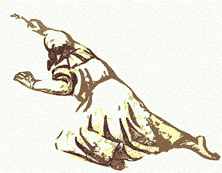The Shekinah Glory (The Tabernacle)
The Presence of the Lord would fill the holy of holies.
Exod 40:34-35 Then the cloud covered the tabernacle of meeting, and the glory of the LORD filled the tabernacle. And Moses was not able to enter the tabernacle of meeting, because the cloud rested above it, and the glory of the LORD filled the tabernacle.

 When
the glory of the Lord came down and filled the tabernacle for the first time it
must have been an awesome spectacle to behold. God was truly pleased with His
people, not because of their goodness but because their sins were covered and
they were hid in Christ who was to come someday. I believe
the high priest sensed a sweetness when he encountered the Presence of the
Lord in the holy of holies. The etymology of the dwelling or presence of God is
the Hebrew word Sh'cheenah or as we pronounce it Shekinah. The term
Shekinah was many times used interchangeably with the word God. In the Jewish
mind it always spoke of the fact that He "dwelt in" or "rested upon"
those who merited His favor, whether an individual, a community, or the entire
Jewish people.
When
the glory of the Lord came down and filled the tabernacle for the first time it
must have been an awesome spectacle to behold. God was truly pleased with His
people, not because of their goodness but because their sins were covered and
they were hid in Christ who was to come someday. I believe
the high priest sensed a sweetness when he encountered the Presence of the
Lord in the holy of holies. The etymology of the dwelling or presence of God is
the Hebrew word Sh'cheenah or as we pronounce it Shekinah. The term
Shekinah was many times used interchangeably with the word God. In the Jewish
mind it always spoke of the fact that He "dwelt in" or "rested upon"
those who merited His favor, whether an individual, a community, or the entire
Jewish people.
Scholars have always seen a striking connection between the concept of the Shekinah and the idea of Logos "The Word" which Philo introduced into Jewish philosophical thinking. Of course a much greater emphasis was placed upon the word Logos when the apostle John introduced his gospel account of the life of Jesus with these suggestive words:
John 1:1-2 In the beginning was the Word, and the Word was with God, and the Word was God. He was in the beginning with God.
In the Jewish Targums, which were popular interpretations or paraphrases of the Old Testament Scripture, there was a tendency to avoid anthropomorphic terms. Therefore the Word was introduced as a mediating factor between God and the world. In particular the chasm between the Divine and human is bridged over by the use of such terms as the Hebrew word memra ("word") and shekinah ("glory"). "The memra proceeds from God, and is His messenger in Nature and history."
Scholars also see the similarities between Shekinah (God's "Presence"), The Holy Spirit of God (Heb. Ruach Elohim; Gr. Pneuma Hagion), and the Hebrew Bat Kol ("The Daughter of the Voice," or God's Voice). Any attempt to draw a substantial difference between these words have never been satisfactorily established and thus they are often used interchangeably.
![]()

Jewish Tradition
Shechinah
According to Jewish tradition the radiance of the Shechinah, with its untold blessings, "rests" upon all those who are pious and righteous. According to ancient Rabbis the Shekinah appears in the midst of at least a minyan of worshipers when they pray in congregation, and of two or more Jews when they engage in the study of Torah, or on a man when he recites the Shema. The Shekinah is said also to rest upon the chaste, the benevolent, and the hospitable, and upon husband and wife when they live in peace and harmony. The ancient Rabbis also said that the Shekinah appeared before Moses at the burning bush, rested upon the Tabernacle in the Wilderness on the day of its dedication, and in the holy of holies in the Temple at Jerusalem, and it has illuminated the bliss of the righteous (Heb. tzaddikim) in the world-to-come ever since.
The Talmudic Sages conceived of the Shekinah as a spiritual essence of indescribable beauty and exalting effect. It was generally spoken of as brilliant light or radiance and when it approached it was announced by a tinkling sound of like an ethereal bell. One interesting Jewish legend even described the dying Moses as being lovingly enfolded in the "wings" of the Shekinah.
It is said that, "Wherever the Jewish people go the Shechinah follows."
Bat Kol
It is interesting to examine the tradition of the Bat Kol which was the voice of God that proclaimed His will and intention, His judgments and His promises, His warnings and His commands to various people, communities, and sometimes to all of Israel. Jewish tradition always spoke of the Bat Kol. When the Torah was given at Sinai the Bible says,
Deut 4:12 "And the LORD spoke to you out of the midst of the fire. You heard the sound of the words, but saw no form; you only heard a voice."
The Bat Kal mysteriously sounded at extraordinary times and this was mentioned in Jewish tradition. For example there is one account that indicates that at the very instant when God took away the soul of Moses with a kiss, the bat Kal rang out over the Israelite camp with the lament, "Moses is dead! Moses is dead!" It also is recognized to have given warnings or passed judgement upon evildoers as recorded in the book of Daniel:
Dan 4:28-32 At the end of the twelve months King Nebuchadnezzar was walking about the royal palace of Babylon. The king spoke, saying, "Is not this great Babylon, that I have built for a royal dwelling by my mighty power and for the honor of my majesty?" While the word was still in the king's mouth, a voice fell from heaven: "King Nebuchadnezzar, to you it is spoken: the kingdom has departed from you! And they shall drive you from men, and your dwelling shall be with the beasts of the field. They shall make you eat grass like oxen; and seven times shall pass over you, until you know that the Most High rules in the kingdom of men, and gives it to whomever He chooses."
The Bat Kol was said to have been heard by the Rabbinic Sages when they had very important decisions to make. The Talmud makes mention that at various times a Bat Kol wound make an announcement during the great assembly known as the Sanhedrin.
There are many instances in the New Testament of the Bat Kol with Jesus and His apostles. John the apostle who wrote the Book of Revelation said:
Rev 1:10-18 I was in the Spirit on the Lord's Day, and I heard behind me a loud voice, as of a trumpet, saying, "I am the Alpha and the Omega, the First and the Last," and, "What you see, write in a book and send it to the seven churches which are in Asia: to Ephesus, to Smyrna, to Pergamos, to Thyatira, to Sardis, to Philadelphia, and to Laodicea." Then I turned to see the voice that spoke with me. And having turned I saw seven golden lampstands, and in the midst of the seven lampstands One like the Son of Man, clothed with a garment down to the feet and girded about the chest with a golden band. . . And when I saw Him, I fell at His feet as dead. But He laid His right hand on me, saying to me, "Do not be afraid; I am the First and the Last. "I am He who lives, and was dead, and behold, I am alive forevermore. Amen. And I have the keys of Hades and of Death."
The Bat Kol is represented in Jewish tradition by the symbol of the dove.
![]()
There was a difference between the temple of God which was the structure itself and the temple of God which was the dwelling place. When Jesus was accusing the Jewish authorities He said, "You have made My Fathers house into a den of thieves," and by saying "My Father" they knew He was claiming Messianic authority over the temple, and so they said, " what sign do you show us seeing that you do these things?" and notice what He said:
John 2:19-21 Jesus answered and said to them, "Destroy this temple, and in three days I will raise it up." Then the Jews said, "It has taken forty-six years to build this temple, and will You raise it up in three days?" But He was speaking of the temple of His body.
They were looking at the physical structure (Heb. Mikdash) of the temple but He said, "Destroy this temple" He used the word in Hebrew 'Mishkan' which was the word used in the Old Testament of the Presence that lit the holy of holies on Yom Kippur in the tabernacle or temple. Jesus said I am the temple (Mishkan) of God. When the glory (Heb. Sh'chinah) would come down like a tornado or funnel right through the roof of the holy of holies and the Presence would manifest on the mercy seat between the cherubim after the blood was sprinkled, that was the mishkan. That Presence was what Jesus said dwelt within Him. And in fact Paul said about the church, "Know ye not that you are the temple (Mishkan) of God?" We, as the body of Christ, have the same Presence dwelling within us. God doesn't dwell in buildings now but within His people. Rmans 10 says that If you confess with your mouth that Jesus Christ is Yaweh and believe in your heart that God raised Him from the dead, you shall be saved. It's that easy. At that point you become the Mishkan of God. When God said, "Let them make Me a sanctuary, that I may dwell among them," He literally said 'in' them. God's ultimate goal has always been to dwell within His people (Jer. 31:31-33) and to put His Spirit within us. When you accept Jesus you become the Mishkan of God.
It is interesting that when the children of Israel had experienced the glory of the Lord coming down they praised the Lord and sensed His goodness and His mercy.2 Chr 7:2-3 "And the priests could not enter the house of the LORD, because the glory of the LORD had filled the LORD'S house. When all the children of Israel saw how the fire came down, and the glory of the LORD on the temple, they bowed their faces to the ground on the pavement, and worshiped and praised the LORD, saying: "For He is good, for His mercy endures forever."
The Presence of the Lord is always a pleasant thing and never something to be afraid of for the believer in Christ. When the Spirit came upon Jesus He came in the form of a dove which was a symbol of affection and caressing in Israel. When Isaiah saw the throne of God and the King in all His glory (Is. 6) he was terrified and expected death at any moment but when a sacrifice is made and the blood is present, the lovingkindness and mercy of the Lord are also present and the people of God are compelled to speak out:
"Truly the Lord is good, for His lovingkindness endures forever."

Read The Bible
- 1599 Geneva Bible (GNV)
- 21st Century King James Version (KJ21)
- American Standard Version (ASV)
- Amplified Bible (AMP)
- Amplified Bible, Classic Edition (AMPC)
- Authorized (King James) Version (AKJV)
- BRG Bible (BRG)
- Christian Standard Bible (CSB)
- Common English Bible (CEB)
- Complete Jewish Bible (CJB)
- Contemporary English Version (CEV)
- Darby Translation (DARBY)
- Disciples’ Literal New Testament (DLNT)
- Douay-Rheims 1899 American Edition (DRA)
- Easy-to-Read Version (ERV)
- English Standard Version (ESV)
- English Standard Version Anglicised (ESVUK)
- Evangelical Heritage Version (EHV)
- Expanded Bible (EXB)
- GOD’S WORD Translation (GW)
- Good News Translation (GNT)
- Holman Christian Standard Bible (HCSB)
- International Children’s Bible (ICB)
- International Standard Version (ISV)
- J.B. Phillips New Testament (PHILLIPS)
- Jubilee Bible 2000 (JUB)
- King James Version (KJV)
- Lexham English Bible (LEB)
- Living Bible (TLB)
- Modern English Version (MEV)
- Mounce Reverse Interlinear New Testament (MOUNCE)
- Names of God Bible (NOG)
- New American Bible (Revised Edition) (NABRE)
- New American Standard Bible (NASB)
- New American Standard Bible 1995 (NASB1995)
- New Catholic Bible (NCB)
- New Century Version (NCV)
- New English Translation (NET)
- New International Reader's Version (NIRV)
- New International Version - UK (NIVUK)
- New International Version (NIV)
- New King James Version (NKJV)
- New Life Version (NLV)
- New Living Translation (NLT)
- New Matthew Bible (NMB)
- New Revised Standard Version (NRSV)
- New Revised Standard Version Catholic Edition (NRSVCE)
- New Revised Standard Version, Anglicised (NRSVA)
- New Revised Standard Version, Anglicised Catholic Edition (NRSVACE)
- New Testament for Everyone (NTE)
- Orthodox Jewish Bible (OJB)
- Revised Geneva Translation (RGT)
- Revised Standard Version (RSV)
- Revised Standard Version Catholic Edition (RSVCE)
- The Message (MSG)
- The Voice (VOICE)
- Tree of Life Version (TLV)
- World English Bible (WEB)
- Worldwide English (New Testament) (WE)
- Wycliffe Bible (WYC)
- Young's Literal Translation (YLT)
Table of Contents
Main Menu
- Ancient Assyrian Social Structure
- Ancient Babylonia
- Ancient Canaan During the Time of Joshua
- Ancient History Timeline
- Ancient Oil Lamps
- Antonia Fortress
- Archaeology of Ancient Assyria
- Assyria and Bible Prophecy
- Augustus Caesar
- Background Bible Study
- Bible
- Biblical Geography
- Fallen Empires - Archaeological Discoveries and the Bible
- First Century Jerusalem
- Glossary of Latin Words
- Herod Agrippa I
- Herod Antipas
- Herod the Great
- Herod's Temple
- High Priest's in New Testament Times
- Jewish Literature in New Testament Times
- Library collection
- Map of David's Kingdom
- Map of the Divided Kingdom - Israel and Judah
- Map of the Ministry of Jesus
- Matthew Henry Bible Commentary
- Messianic Prophecy
- Nero Caesar Emperor
- Online Bible Maps
- Paul's First Missionary Journey
- Paul's Second Missionary Journey
- Paul's Third Missionary Journey
- Pontius Pilate
- Questions About the Ancient World
- Tabernacle of Ancient Israel
- Tax Collectors in New Testament Times
- The Babylonian Captivity
- The Black Obelisk of Shalmaneser
- The Books of the New Testament
- The Court of the Gentiles
- The Court of the Women in the Temple
- The Destruction of Israel
- The Fall of Judah with Map
- The History Of Rome
- The Incredible Bible
- The Jewish Calendar in Ancient Hebrew History
- The Life of Jesus in Chronological Order
- The Life of Jesus in Harmony
- The Names of God
- The New Testament
- The Old Testament
- The Passion of the Christ
- The Pharisees
- The Sacred Year of Israel in New Testament Times
- The Samaritans
- The Scribes
Ancient Questions
- Why Do the Huldah Gates Appear Different in Ancient Replicas and Modern Photos?
- What Is the Origin of the Japanese and Chinese Peoples? A Biblical Perspective
- How did the ancient Greeks and Romans practice medicine and treat illnesses?
- What were the major contributions of ancient Babylon to mathematics and astronomy?
- How did the ancient Persians create and administer their vast empire?
- What were the cultural and artistic achievements of ancient India, particularly during the Gupta Empire?
- How did ancient civilizations like the Incas and Aztecs build their remarkable cities and structures?
- What were the major trade routes and trading practices of the ancient world?
- What was the role of slavery in ancient societies like Rome and Greece?
- How did the ancient Mayans develop their sophisticated calendar system?
Bible Study Questions
- Why Do Christians Celebrate Christmas?
- How Many Chapters Are There in the Bible?
- The Five Key Visions in the New Testament
- The 400-Year Prophecy: Unpacking Genesis 15 and the Journey of a People
- The Authorized (King James) Version (AKJV): Historical Significance, Translation Methodology, and Lasting Impact
- Exploring the English Standard Version (ESV): Its Aspects, Comparisons, Impact on Biblical Studies, and Church Use
- A Detailed Historical Analysis of Language Updates in the KJ21: Comparison with Other Versions
- A Detailed Historical Analysis of the American Standard Version (ASV): Comparison to the King James Version, Influence on Later Translations, and Evaluation of Strengths and Weaknesses
- A Detailed Historical Analysis of Amplifications in the Amplified Bible (AMP) and Its Comparison to Other Bible Translations
- Detailed Historical Analysis of the Amplified Bible Classic Edition (AMPC): Examples of Amplifications and Comparative Analysis with Other Bible Translations
About
Welcome to Free Bible: Unearthing the Past, Illuminating the Present! Step into a world where ancient history and biblical narratives intertwine, inviting you to explore the rich tapestry of human civilization.
Discover the captivating stories of forgotten empires, delve into the customs and cultures of our ancestors, and witness the remarkable findings unearthed by dedicated archaeologists.
Immerse yourself in a treasure trove of knowledge, where the past comes alive and illuminates our understanding of the present.
Join us on this extraordinary journey through time, where curiosity is rewarded and ancient mysteries await your exploration.
Recent posts
-

Best Paphos property developers (and how to choose the right one)
Buying property in Paphos is one of the most popular real-estate decisions in Cyprus, whether the goal is relocation, lifestyle living, or long-term i... -

CQR Pants vs 5.11 Tactical: My Honest Review After Hiking the Jesus Trail and Via Dolorosa
After walking 65 kilometers through the Galilee hills and navigating Jerusalem's ancient stone streets, I can tell you exactly which tactical pants su... -

Finding the right services for immigrants in the United States
As we understand, life for immigrants in the United States can be challenging, especially in the early stages. Once you have solved the most important... -

Onigiri packaging for retailers and cafés
Onigiri packaging for retailers and cafés plays a crucial role in preserving freshness, ensuring food safety, and enhancing product presentation. As ... -

How to Choose the Perfect Christian Living Community
Did you know that two-thirds of Americans identify as Christians and more than half of those attend religious services more than once a month? When se...